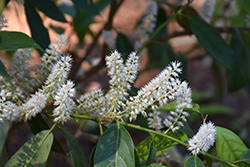It's all about ...
plants

Height: 10 feet
Spread: 6 feet
Sunlight:
![]()
![]()
Hardiness Zone: 8a
Description:
A multi-branched, low arching shrub featuring pendulous, draping racemes of small white flowers in spring; spreads to form colonies; not commonly found in gardens but definitely worthy; excellent for naturalizing or screening
Ornamental Features
Chinese Sweetspire is draped in stunning racemes of fragrant white flowers along the branches from mid to late spring. Its glossy oval leaves emerge chartreuse in spring, turning dark green in colour the rest of the year.
Landscape Attributes
Chinese Sweetspire is a dense multi-stemmed evergreen perennial with a shapely form and gracefully arching foliage. Its medium texture blends into the garden, but can always be balanced by a couple of finer or coarser plants for an effective composition.
This plant will require occasional maintenance and upkeep, and should only be pruned after flowering to avoid removing any of the current season's flowers. Gardeners should be aware of the following characteristic(s) that may warrant special consideration;
- Suckering
Chinese Sweetspire is recommended for the following landscape applications;
- Mass Planting
- Hedges/Screening
- General Garden Use
- Naturalizing And Woodland Gardens
Planting & Growing
Chinese Sweetspire will grow to be about 10 feet tall at maturity, with a spread of 6 feet. It has a low canopy with a typical clearance of 1 foot from the ground. Although it is technically a woody plant, this plant can be expected to behave as a perennial in our climate if planted outdoors over the winter, usually regrowing from its base (crown) the following year. As such, gardeners should take into consideration that it will perform differently than it would in its native habitat.
This plant does best in full sun to partial shade. You may want to keep it away from hot, dry locations that receive direct afternoon sun or which get reflected sunlight, such as against the south side of a white wall. It is quite adaptable, prefering to grow in average to wet conditions, and will even tolerate some standing water. This plant does not require much in the way of fertilizing once established. It is not particular as to soil type or pH. It is somewhat tolerant of urban pollution. This species is not originally from North America.
This plant is not reliably hardy in our region, and certain restrictions may apply; contact the store for more information.
